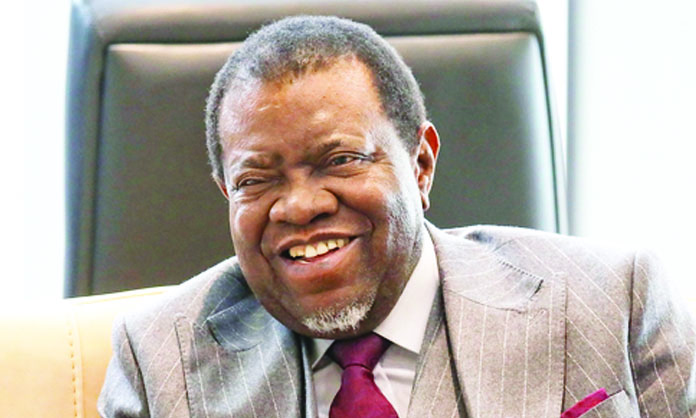President Hage Geingob set the stage at the opening ceremony of the high-level segment at COP28 by highlighting Namibia’s green industrialisation ambitions.
Geingob says since the announcement of the country’s plans to develop a large-scale green hydrogen project on the margins of COP26 in Glasgow, the country has made significant progress to produce clean molecules to aid in global decarbonisation.
“Today as part of our efforts to build green industrial clusters in Namibia, we are developing more than nine green hydrogen projects,” he said in Dubai.
Over the last two years, Namibia has focused its gaze on securing funds for its green industrialisation efforts and showing leadership in the renewable energy sector.
On Saturday, Namibia was one of 116 countries to sign the Global Renewable Pledge and Energy Efficiency Pledge.
Geingob said Namibia has already taken significant steps to accelerate the deployment of renewable energy.
He pledged the deployment of 10 gigawatts of renewable energy in the next 20 years. This amount is more than 30 times Namibia’s current energy generation capacity.
“We are currently developing nine different green hydrogen projects that are looking to use renewable energy to produce clean molecules that will decarbonise various sectors of our economies including transport and agriculture and create new industries such as those emanating from the chemicals and basic materials sectors.
These activities promise to diversify our exports and will significantly bolster our gross fixed capital formation,” he said.
Geingob also reiterated Namibia’s ambition to become a renewable energy superpower.
These ambitions are in line with the African Union’s agenda 2063 and the African Leaders Nairobi Declaration on climate change and call to action.
“By harnessing the power of renewable energy, Namibia aims to propel a new era of economic growth that is both environmentally conscious and socially inclusive.
Our ambition is clear: to position Namibia as a hub for renewable energy innovation, driving green industrialisation that creates jobs, fosters economic development and ensures energy access for all,” he said.
The global renewable and energy efficiency pledges are a part of the Global Decarbonisation Accelerator which hopes to address the critical aspects of the energy transition.
Namibia’s green hydrogen commissioner James Mnype says Namibia has engaged different leaders on topics in and around climate change.
“We have spoken about everything from mobilising capital, to how do we work together for certification of green molecules, today we are looking at offtake support mechanisms. The Namibian house is a hive of activity,” he said on Sunday.
The Namibian Pavillion is the country’s hub at COP28 and the site of various panel discussions and information sessions.
RMB Namibia sponsored N$200 000 to the Ministry of Environment, Forestry and Tourism for the Namibian Pavilion at COP28.
Geingob also participated in the G77 plus China Leaders Summit, along with international relations minister Netumbo Nandi-Ndaitwah and environment minister Pohamba Shifeta.
At the G77 summit, Geingob emphasised Namibia’s commitment to global climate justice and equity.
The sixth report of the intergovernmental panel on climate change identifies Namibia as one of the most vulnerable nations in sub-Saharan Africa with rising temperatures, increased evaporation and rainfall variability.
Stay informed with The Namibian – your source for credible journalism. Get in-depth reporting and opinions for
only N$85 a month. Invest in journalism, invest in democracy –
Subscribe Now!







